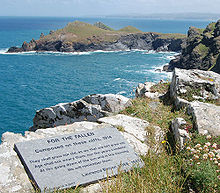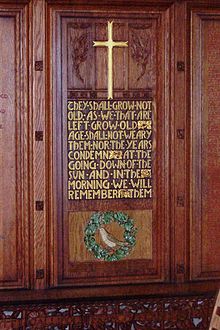- Ode of Remembrance
-
The "Ode of Remembrance" is an ode taken from Laurence Binyon's poem "For the Fallen", which was first published in The Times in September 1914.
The poet wrote For the Fallen, which has seven stanzas, while sitting on the cliffs between Pentire Point and The Rumps in north Cornwall, UK. A stone plaque was erected at the spot in 2001 to commemorate the fact. The plaque bears the inscription
- For the Fallen
- Composed on these cliffs 1914
However there is also a plaque on the beehive monument on the East Cliff above Portreath in central North Cornwall which cites that as the place where Binyon composed the poem.
The poem honoured the World War I British war dead of that time and in particular the British Expeditionary Force, which had by then already had high casualty rates on the developing Western Front. The poem was published when the Battle of the Marne was foremost in people's minds.
Over time, the third and fourth stanzas of the poem (although often just the fourth)[1] were claimed as a tribute to all casualties of war, regardless of state.
- They went with songs to the battle, they were young.
- Straight of limb, true of eyes, steady and aglow.
- They were staunch to the end against odds uncounted,
- They fell with their faces to the foe.
- They shall grow not old, as we that are left grow old:
- Age shall not weary them, nor the years condemn.
- At the going down of the sun and in the morning,
- We will remember them.
The line Lest we forget is often added to the end of the ode, which is repeated in response by those listening, especially in Australia. In the United Kingdom and New Zealand, the final line of the ode, "We will remember them", is repeated in response. In Canada, the last stanza of the above extract has become known as the Act of Remembrance, and the final line is also repeated.
The "Ode of Remembrance" is regularly recited at memorial services held on days commemorating World War I, such as ANZAC Day, Remembrance Day, and Remembrance Sunday. In Australia's Returned and Services Leagues, it is read out nightly at 6 p.m., followed by a minute's silence. In New Zealand it is part of the Dawn service at 6 a.m. Recitations of the "Ode of Remembrance" are often followed by a playing of the Last Post. In Canadian remembrance services, a French translation[2] is often used along with or instead of the English ode.
Contents
Musical settings
Sir Edward Elgar set to music three of Binyon's poems ("The Fourth of August", "To Women", and "For the Fallen", published within the collection "The Winnowing Fan") as The Spirit of England, Op. 80, for tenor or soprano solo, chorus and orchestra (1917). His setting of "For the Fallen" sparked some controversy as it was published shortly after another setting of the same poem by the composer Cyril Rootham. Neither composer was responsible for this, and Elgar initially offered to withdraw but was persuaded to continue by the literary and art critic Sidney Colvin and by Binyon himself.[3]
"They shall grow not old..." was set to music by Douglas Guest in 1971, and has become a well-known feature of choral services on Remembrance Sunday. Nottingham-based composer Alex Patterson also wrote a setting of the text in 2010 [4]. The text of For the Fallen has also been set by Mark Blatchly for treble voices, organ and trumpet (which plays The Last Post in the background)[5].
Time of our Darkness, the title of a novel by South African author Stephen Gray, is a reference to the last two lines of For the Fallen: 'As the stars that are starry in the time of our darkness, To the end, to the end they remain.'
'Condemn' or 'contemn'?
There has been some debate as to whether the line “Age shall not weary them, nor the years condemn” should end with the words ‘condemn’ or ‘contemn’. Contemn means to ‘despise’ therefore either word would make sense in the context of the stanza. When the poem was first printed in The Times on 21 September 1914 the word ‘condemn’ was used. This word was also used in the anthology The Winnowing Fan: Poems of the Great War in 1914 in which the poem was published later. If the original publication had contained a misprint Binyon would have had the chance to make amendments, so it seems unlikely that the word 'contemn' was meant. The issue of what word was meant seems only to have arisen in Australia, with little debate in other Commonwealth countries that mark Remembrance Day.[6]
References
- ^ "Ode of Remembrance". Fifth Battalion The Royal Australian Regiment Official Website. Archived from the original on 2007-03-13. http://web.archive.org/web/20070313110108/http://5rar.asn.au/ode.htm. Retrieved 2007-06-12. "Titled; For the Fallen, the ode first appeared in The Times on 21 September 1914. It has now become known in Australia as the Ode of Remembrance, and the verse in bold above is read at dawn services and other ANZAC tributes."
- ^ "French translation of the Act of Remembrance". http://www.veterans.gc.ca/fra/archives/ressources/guide/actedusouvenir. Retrieved 1 November 2011.
- ^ Elgar studies. John Paul Edward Harper-Scott, Julian Rushton, p.225
- ^ [1]
- ^ "For the Fallen" by Mark Blatchly, recorded by St Paul's Cathedral Choir on Hyperion Records
- ^ Anzac Day - Traditions, Facts and Folklore: Words of Remembrance
External links
Categories:- British culture
- Australian culture
- New Zealand culture
- Canadian culture
- Military life
- World War I poems
- 1914 poems
- Works originally published in The Times
Wikimedia Foundation. 2010.


